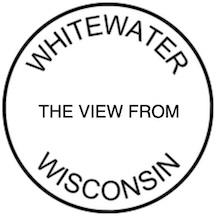Good morning.

Monday in Whitewater will be sunny with a high of 80. Sunrise is 6:29, and sunset is 7:13, for 12h 43m 53s of daytime. The moon is a waxing crescent with 32.9 percent of its visible disk illuminated.
Whitewater’s Planning Board meets at 6 PM.
On this day in 1839, John Herschel takes the first glass plate photograph.
What conditions should a local government body always meet? Two come to mind in all cases.
First, board members must not vote or deliberate on matters in which they have a conflict of interest. This should be evident to a person of average understanding, and yet, throughout the last decade, the Whitewater Community Development Authority was plagued with conflicts repeatedly. Someone so implicated who looks at this situation without personal contrition and insists that these conflicts do not matter is, and always will be, unsuited for public life.
At Planning, for example, the board chairman should ask all board members before a significant matter with competitive implications: does anyone on this board have a conflict that he or she should declare? Those who remain silent yet have material conflicts known or discovered are unfit to stay on that public body. (Note well: this question from a chairperson is for those for those on a board or commission.)
Second, public comment in Whitewater often comprises both ordinary residents and special interests advancing their economic gain (e.g., principals, operatives, catspaws, etc.). See The Special-Interest Hierarchy of a Small Town and The Special-Interest Hierarchy of a Small Town (Adjacent Support). Almost all ordinary residents will have sincere reasons for supporting or opposing a policy; special interests will manipulate a few people now and again for the special interests’ own ends.
Boardmembers should consider of those who seek or oppose government action: cui bono? For whose benefit? In Whitewater’s case, is it for the community or for a few aged men who want to prevent competitive opportunity?
How Much Cheese Do Americans Eat Per Year?:
